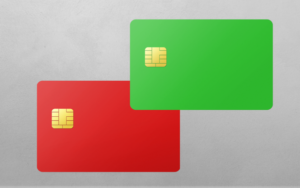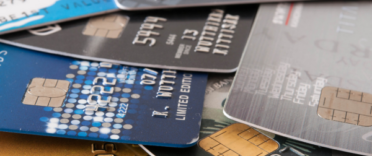 There are upsides and downsides to taking out a credit card that you should consider before you fill out an application. For some users the flexibility and rewards will outweigh the potential costs of taking on extra debt, but for others it will not. In this article we explore the most important credit card advantages and disadvantages to give you a full picture of how the plastic in your wallet could affect your finances.
There are upsides and downsides to taking out a credit card that you should consider before you fill out an application. For some users the flexibility and rewards will outweigh the potential costs of taking on extra debt, but for others it will not. In this article we explore the most important credit card advantages and disadvantages to give you a full picture of how the plastic in your wallet could affect your finances.
What are the advantages of a credit card?
There are a whole host of different ways to use a credit card and lots of reasons why you might want one. Here are the key advantages to taking out a credit card:
| Advantages of a credit card | Disadvantages of a credit card |
| Buy now, pay later | Debt can be risky |
| Spread the cost of what you buy | The temptation to overspend |
| Borrow flexibly | The best features require a good credit score |
| Borrow interest free | Interest rates can be very high |
| Earn rewards and cashback | Taking out cash is expensive |
| Get free payment protection | Fees and charges may be expensive |
| Cover unexpected bills | |
| Build a credit history | |
| Clear expensive debt |
Buy now, pay later
The most basic feature of a credit card is that what you buy with the card, you pay for later. The fundamental difference between using a debit card and a credit card is that with a debit card the money comes straight out of your current account, but with a credit card you settle what you owe at a later date. This could be when your bill arrives at the end of the month or much later. It could be before your interest-free period ends, or after the sum has started to grow with interest. Whichever way you use your card, you will have the advantage of a period of time between when you buy something and when you need to actually pay for it. This could be enough time for your salary to be paid, provide you with a way to pay in several smaller instalments or perhaps give you the opportunity to prioritise higher-interest debt.
Spread the cost of what you buy
The balance that you build up by spending on your credit card does not need to be fully paid off at the end of the month. This means that you could make a purchase, and then steadily clear your balance through monthly payments.
Spreading the cost through monthly instalments works well with a 0% purchase credit card, as you will get a longer period of time to clear the balance before interest starts to build. For example, you could buy a £600 sofa on a 12-month 0% interest credit card, then clear the balance by paying £50 each month. You will clear your debt before the 0% offer ends and you will not pay any interest on the £600 you borrowed.
It is much more efficient to pay off your balance in equal instalments rather than defaulting to the minimum payment. We explain this in more detail in our article ‘What is the minimum payment on a credit card?’.
Spreading the cost of something you buy using a standard purchase credit card will likely be expensive, as your balance will usually start to grow with interest after 56 days. You can check out the best 0% purchase credit cards in our ‘Compare the Best 0% purchase credit cards’ article.
Borrow flexibly
With a credit card, you pay back what you spend plus any interest, fees or charges. This is one of the important advantages of credit cards over loans. If you take out a £1,000 loan, but you only spend £800, you will still pay interest on the extra £200 even if it stays in your current account. A credit card allows you to spend what you need – up to your credit limit – and pay back what you owe.
We compare loans and credit cards in more detail in our article ‘Is it better to get a credit card or a personal loan?’.
Borrow interest free
By spending on a credit card, and then paying off your balance before your interest-free period ends, you are essentially borrowing money for free. In many instances using a credit card can be a form of interest-free borrowing, however, you may be limited by what you can use the card for, for example, you would not be able to take out cash for free or pay for something where the vendor does not accept credit cards. With most credit cards the interest-free period will last for 56 days, but many cards offer a much longer timeframe.
Keep in mind that any balance that remains after your interest-free period ends will grow with interest. Learn more about interest on credit cards in our article ‘What does 0% interest, or APR, mean on a credit card?’.
Earn rewards and cashback
Spending on a credit card can earn you back a percentage of what you spent in cashback, or allow you to accumulate reward points or airmiles. This can be a way of making your everyday spending pay or turning an inevitable big expense into a positive. For example, if you know you spend £200 a month at a certain supermarket, you could use a rewards credit card affiliated with that shop to earn points that can be converted into money-off vouchers. Alternatively, if you know you will need to make a big purchase like replacing your washing machine or buying a new mattress, you could use a credit card that pays out bonus reward points on spending a certain amount in the first few months.
We have the best offers going in our article ‘Compare the best cashback and reward credit cards’. If you prefer to turn your spending into airmiles, read our article ‘Which are the best air miles credit cards – and should I get one?’.
Get free payment protection
Using a credit card in the UK provides you with free, legally-enshrined payment protection – so long as your purchase costs more than £100 and not more than £30,000 – thanks to Section 75 of the Consumer Credit Act. Your credit card provider is jointly liable with the retailer if something you order doesn’t arrive or is faulty. You are also covered if the company you paid to complete a service goes bust or if something else goes wrong in the purchase process. This ultimately means that you should be refunded if you do not get what you paid for.
Debit cards also offer a form of protection through the chargeback scheme, which also protects card purchases beyond the limits of Section 75. However, only Section 75 is part of UK law. Chargeback is a voluntary policy that card providers can choose to opt in or out of.
We explain your rights under Section 75 in more detail in our article ‘Section 75 of the Consumer Credit Act explained – plus how to claim’.
Cover unexpected bills
Some bills are regular and easy to budget for, while others come out of nowhere. One of the key credit card advantages is having a line of credit available should you need to make an emergency purchase or cover an unexpected bill. This could be a sudden vet bill or a last-minute hotel booking because of an emergency. You may not have the cash to make the purchase outright, but paying on your credit card means you will usually have at least 56 interest-free days to pay off the balance.
Build a credit history
Some credit cards can be used to build up your credit score, either by creating a history of good borrowing from scratch or rebuilding it after a default. By making regular purchases on the card and paying off the balance in full every month, you can fill your credit file with examples of good, reliable borrowing. This is important because successfully applying for the best credit cards will usually require a good credit score. Therefore, in order to make the most of the main advantages of credit cards, you will need to boost your credit score and build a credit history that can show lenders you are a reliable borrower.
We explain in more detail how a credit card can be a useful tool to build credit in our article ‘How to build your credit score with a credit card’. You can then find the best credit-builder cards in our article ‘Compare the best credit cards to build credit and improve bad credit’.
Clear expensive debt
A credit card can be a tool to consolidate and clear expensive debt. This can be done in one of a few different ways.
If you have debt on a high-interest credit card, you could transfer the balance over to a card that does not charge any interest using a 0% balance transfer credit card. You will usually need to pay a balance transfer fee of a percentage of the amount you are moving over, though some no-fee cards are available. Take a look at the options in our article ‘Best 0% balance transfer credit card deals’. You will need to clear the balance by the end of the interest-free period, or you will likely see the rate go up sharply.
Someone with debt on multiple cards – whether it is high-interest or not – could also benefit from a 0% interest balance transfer card, as you can consolidate debt from multiple cards onto one. This comes with the benefit of the 0% interest period, but also the simplification of having all of your credit card debt in one place and just one payment to make each month. Read our article ‘How to consolidate debt with a credit card’ to learn more.
It is also possible to use a credit card to pay off other debt using a money-transfer credit card, which allows you to build up a balance on the card by transferring money to a current account, rather than spending with the card. We explain more in our article ‘Can I use a 0% credit card to clear loan debt – and is it a good idea?’. We also list the best money-transfer credit cards in our article 'Complete guide to the best money-transfer credit cards'.
How to find out which credit card is best for you
Comparing different credit cards is a key part of getting the best deal for you. Money to the Masses has helped to simplify this process by partnering with Creditec*, an online comparison service. You do not need to trawl through countless different provider websites hunting for the best cashback or lowest fees, as Creditec’s personalised search results will show you the key details you need to know in one place. Your tailored list will also feature the cards that you are more likely to be accepted for, cutting down the chance of any applications you make being rejected. Your search results are built using a soft credit search, so there will be no damage to your credit score. You can start your search by clicking this link*.
What are the disadvantages of a credit card?
A credit card will not suit every single financial situation, so you may find that your personal circumstances make taking out a credit card expensive or risky. Here are the main disadvantages to getting a credit card:
Debt can be risky
Using a credit card involves spending money you will need to repay later. In some cases, this debt can be expensive, stressful and cause long-term damage to your finances. While there are many people able to take advantage of the great features of credit cards and boost their finances, there are also people who will find themselves falling deeper into a debt spiral.
Credit card providers will set a minimum payment on a credit card, though you should try to pay off more than the minimum each month. If you cannot make this minimum amount, or you do not pay it on time, you risk damaging your credit score, losing any special offer on the card and having to pay a late-payment charge. Read our article 'What happens if I don’t pay off my credit card?' to learn more.
The best way to deal with debt is to get help and act fast. There is free, independent, expert help available to everyone in the UK. We explain where to go in our article ‘Where to get free debt advice’.
The temptation to overspend
One of the main disadvantages of credit cards is the temptation to overspend. The money does not come out of your current account straight away like it does with a debit card, so it can be easy to pay now and worry about it later. This can lead to a build-up of debt and having to pay interest on your spending.
Your spending is limited by your credit limit – the maximum amount the credit card company allows you to borrow. The best way to use a credit card is to spend money how you would with any other payment method and not be tempted to spend up to your credit limit or to make extra purchases to earn more rewards. In most cases, the value of the reward points will not outweigh the extra money you spend.
The best features require a good credit score
Some of the advantages of credit cards apply only to a select group of credit cards that are aimed at applicants with good credit scores. If you have a poor credit score, you will likely only be able to get a basic credit card. If your credit score is just off what would be considered a 'good' score, you may find that you are able to get some of the best credit cards but at slightly reduced terms. This could mean a shorter interest-free period than you had hoped for or a higher interest rate.
You can find out which credit cards you are likely to be successful in applying for through an eligibility checker, which will not affect your credit score. Find out more in our article ‘Check credit card eligibility: What credit cards am I eligible for?’.
If you are disappointed in the range of credit cards available, read our article ‘The best way to check your credit score for free’ to find out more about your credit file, then check out the tips in our article ‘How to improve your credit score quickly’. Improving your credit score and building up a strong credit history will expand the range of cards available to you.
Interest rates can be very high
It is possible to use a credit card to borrow money without paying any interest by clearing the balance before the interest-free period ends. However, the card will still have an interest rate that applies at the end of this period. In some cases, the amount you owe can grow very quickly once the interest rate kicks in and your debt compounds. That is why it is so important to clear your balance before the end of your interest-free period, whether that is the standard 56 days or a special offer from a 0% purchase credit card. If you are unable to clear your balance in this timeframe, you may find that the interest rate on your debt is much higher than if you had a loan.
Taking out cash is expensive
One of the key disadvantages of credit cards is that taking out cash is usually very expensive. Most credit card providers will apply a high rate of interest to any balance you build up through cash withdrawals, even if you are within a 0% offer period. 0% purchase credit cards charge no interest on purchases for a limited time, but cash withdrawals are considered a form of cash advance rather than a purchase.
To make matters worse, the interest is usually applied instantly. This means that taking out £20 from an ATM will cost you much more than the cash is worth, even if you pay off your balance in full at the end of the month. Withdrawing cash is one example of when it is better to use a debit card than a credit card. We go over a few more examples in our article ‘Credit card vs debit card: Which should you use and when?’.
Fees and charges may be expensive
Some of the best credit cards are not free. In order to get the very best rewards from your card, you may need to pay a hefty annual fee. This can erode the value of the card, or push you to spend more money to compensate for the outlay through extra rewards points. Earning thousands of rewards points, special vouchers or extra cashback is great, but you will need to work out if the benefits of the credit card outweigh the cost of paying the annual fee.
You can account for high annual fees by comparing credit cards using representative APR, which is the total percentage cost of that card over a year including any standard fees. We go into more detail in our article ‘What is representative APR?’.
As well as standard charges like annual fees, most credit cards will charge late fees if you do not make your repayments on time.
Learning more about credit cards
We have a wide range of articles to help you understand the basic details and the more complicated features of credit cards. A good place to start is our article ‘What is a credit card?’. If you are still unsure whether a credit card would suit you, read our ‘Should I get a credit card?’ article.
If you have decided a credit card is the right option for you, learn how to apply by reading ‘How to apply for a credit card’ and explore the options in our ‘Best credit cards in the UK’ article.
If a link has an * beside it this means that it is an affiliated link. If you go via the link Money to the Masses may receive a small fee which helps keep Money to the Masses free to use. But as you can clearly see this has in no way influenced this independent and balanced review of the product.






